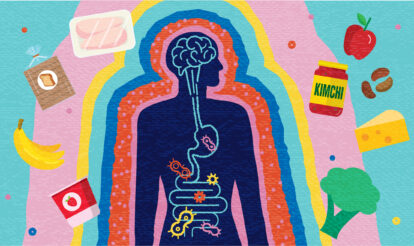
Could modifying your gut microbiome help manage IBS symptoms?
Could modifying your gut microbiome help manage IBS symptoms?

If you’re one of the millions living with the often-debilitating pain and sometimes embarrassing symptoms of Irritable Bowel Syndrome (IBS), you probably know how challenging this condition can be. You’ll have visited a doctor a few (or many) times hoping for answers, only to be told there’s no cure for IBS, and that you could have limited success with managing the symptoms.
IBS is a bit of a mystery to researchers. However, there is evidence of a link between IBS and the gut microbiome (more on that to come), and that has researchers wondering if it might hold the key to managing IBS symptoms.
What is the Gut Microbiome?
There is a vast microscopic ecosystem in your digestive tract – that’s the gut microbiome. It’s basically a collection of around 100 trillion microorganisms and their genes that live and work together.¹ The microorganisms are called microbiota or microbes, and are made up of tens of thousands of different species.² Most are bacteria, but there are also fungi, protozoa, yeasts, and even parasites in the mix.¹ Most microorganisms live happily in your colon with a smaller amount in your small intestine. The colon is home to more than 70% of the microbes in your body.²
Scientists know that your gut microbiota perform the critical role of helping to feed the cells in your colon and keep them healthy. These microorganisms also help produce some B vitamins and vitamin K, and act as a sort of defense system, keeping any harmful bacteria out of your GI tract, or digestive system.²
Research into the gut microbiome has rapidly increased, and now, scientists are aware of the important role your gut microbiome plays in your overall health¹. It’s thought the microbiome is a sort of health-supporting organ that influences your metabolism and helps support overall well-being. Exciting research suggests there is a back-and-forth conversation between your gut microbiome and brain – known as the gut-brain axis – and scientists are exploring its role in IBS.
It could be that the trillions of tiny lives in our microbiome could hold important secrets to our better health and well-being.
Scientists have noticed that, compared with those of healthy people, the microbiomes of people with health conditions such as Irritable Bowel Syndrome (IBS) and Inflammatory Bowel Disease (IBD), are different.⁵,⁶,⁷
Scientists experimenting with modifying the microbiome, have found these conditions or their symptoms, often improve.¹ In studies on people with IBS, it’s been found that changing the microbiome – by adding specific types of bacteria from a probiotic supplement – reduces symptoms including abdominal pain, bloating, diarrhoea, or constipation in some people.¹⁵,¹⁶,¹⁹
How Gut Bacteria Support Digestive Health
Everyone’s microbiome is different, and while there might be similarities in the types and amounts of microbes, the exact composition of our microbiome are as individual to each of us as our fingerprints – it even varies among identical twins.¹
In healthy people, the gut microbiome tends to be diverse, with far more health-promoting microbes than harmful ones. These microbes support each other and the health of the gut, but they also support the immune system and limit the number of harmful microbes that live in the gut.
Beneficial bacteria break down and ferment fibre your small intestine can’t digest. When it ferments undigested fibre, bacteria produces various compounds. Some of these compounds help regulate blood sugar and appetite.¹ Healthy bacteria also produce short-chain fatty acids that feed the cells in your colon, keeping the lining strong and healthy, and helping with the gut and brain conversation.³
Healthy bacteria play a role in regulating the nerves and muscles in your digestive tract, allowing your intestines to sense when food is on the way and help move it through your body and out as waste. There’s also evidence that your microbiota help to strengthen the lining of your intestines. This is important because if the lining becomes too permeable, toxins can leak out into your bloodstream, or harmful pathogens could enter your gut, triggering an immune reaction or severe inflammation.²,⁷,⁹
A healthy gut microbiome has several main groups of bacteria. They’re usually present in these ratios:²,⁶,⁷
- Firmicutes (about 64%)
- Bacteroidetes (about 23%)
- Proteobacteria (less than 8%)
- Actinobacteria (less than 3%)
- Fusobacteria and Verrucomicrobia (less than 1%).
When the Microbiome Becomes Unbalanced
Your microbiome changes throughout your life – for example the microbiome of a new baby born through the birth canal will resemble that of their mother’s. In the first few years of life, a child’s microbiome becomes increasingly diverse until it stabilises into that of an adult. Still, microbiome continues to change throughout your life, depending on what you eat, your environmental exposures, or an illness.⁷,⁸
The microbiome can experience an imbalance called dysbiosis. It results in a less diverse microbiome where certain microbes crowd out other friendly microbes. Dysbiosis occurs in many chronic conditions, including IBS.¹ What isn’t clear, is whether dysbiosis in the gut microbiome is a cause of this condition or an effect.
People with IBS often report symptoms starting after a severe bout of food poisoning or a gastrointestinal virus. An encounter with parasites, viruses, or harmful bacteria can disrupt the microbiome and trigger inflammation in the gut which can increase the risk of IBS.⁷
Long-term use of antibiotics can also cause dysbiosis in your microbiome. It, too, is a significant risk factor for IBS.
Your diet is one of the most significant microbiome modifiers – what you eat has both short-term (often within days)² and long-term effects on the microbes in your gut. Studies show a link between a Western-style diet (high in processed foods, added sugar, unhealthy fats) and dysbiosis.¹¹ Diets rich in high-fibre plant foods lead to a healthier, more diverse microbiome, and the best way to improve this diversity is to increase your consumption of a variety of plants.⁸ The challenge for IBS sufferers is that many high-fibre foods can trigger symptoms.
Other factors that contribute to dysbiosis include:⁸,¹²,¹³
- Cigarette smoking
- Excess alcohol
- Recreational drugs
- Chronic psychological stress or depression
- A sedentary lifestyle
- Environmental toxins
- Lack of sleep or disruptions in your circadian rhythms.
So, understanding the link between lifestyle and your microbiome is a great way to prevent dysbiosis.
The IBS Gut Microbiome
About 73% of people with IBS have dysbiosis, compared with 16% of healthy people. Studies show that with IBS, there is frequently an increase in the ratio of the main bacteria groups Firmicutes and Bacteriodetes, as well changes to specific bacteria species within those groups.⁷,¹⁰,²²
Among the theories about IBS and the gut microbiome is one that that dysbiosis might contribute to intestinal permeability (known as leaky gut), which can cause an immune reaction in the inner lining of the gut. Some experts consider leaky gut to be an early event in IBS as it’s linked with symptoms such as diarrhoea and pain.¹⁰
Another theory is that changes in the microbiota cause the intestines to become overly sensitive causing pain or for waste to move more slowly, or too quickly, resulting in constipation or diarrhoea. Researchers found that when they transferred an IBS microbiome into animals without IBS, it triggered IBS symptoms.¹⁰
Once dysbiosis occurs, the mix of microbes changes, as do the fermentation byproducts they produce. This is why people with IBS often have a different combination of short-chain fatty acids and more gas-producing bacteria in their GI tract.¹⁰
The Role of Probiotics
Aside from making changes to your diet or lifestyle, probiotics could be the way to modify your microbiome and potentially manage IBS symptoms. Probiotics are live and active organisms and can provide health benefits when taken in the right doses. They contain specific species and strains of beneficial bacteria and yeasts found in your GI tract. Probiotic supplements can also help to protect your gut with extraeneficial microbes, which support a healthy microbiome.
Probiotic supplements aren’t the same as fermented or cultured foods made with live and active cultures, such as yoghurt, kefir, or sauerkraut. That’ doesn’t mean cultured or fermented foods aren’t good for you, but their live microorganism counts aren’t anywhere near as high as they are in a probiotic supplement.
Good probiotic supplements are tested at specific doses, and must be safe and show a health benefit at the provided amount. They must also contain enough live microbes which must still be alive after passing into your GI tract, to provide you with benefits. The number of microbes are listed on a product label as colony-forming units (CFUs).¹⁴
The great thing about probiotic supplements is that they provide consistent dosing, and many contain specialized species or strains. Each species contributes something different to the microbiome, and sometimes they work better in specific combinations. Taking a probiotic supplement doesn’t guarantee a specific health outcome, but taking one can help to support a healthier microbiome, and, in turn, could help manage the symptoms of health conditions such as IBS.
Probiotics need to eat to live, thrive, and multiply, and prebiotic fibre is their preferred diet – that’s what they break down and ferment. Prebiotic fibre is found in many plant foods, but you need to choose those that are low in fermentable oligosaccharides, disaccharides, monosaccharides, and polyols (FODMAPs). FODMAPs are sugars and carbs that are poorly digested and absorbed in the small intestine. They attract water as they pass into your colon, which contributes to diarrhea, and once they reach your colon, the bacteria living there ferment the undigested sugars and carbs, causing gas and bloating.
Cutting back on high FODMAP foods (such as onions, garlic, mushrooms, and apples) often helps reduce IBS symptoms such as gas, bloating, and diarrhea. The key is to eat plenty of low FODMAP foods (such as carrots, eggplants, and oranges) to get enough prebiotic fibre.
FODMAP-friendly prebiotic supplements can also help. One of the best for IBS is partially hydrolyzed guar gum. It’s a low FODMAP prebiotic fibre that’s easy to digest and won’t worsen IBS symptoms. Some probiotics come paired with the right type of low FODMAP prebiotic.
The Best Probiotics for IBS
There’s still much to learn about how probiotics might help with IBS symptoms, but the research so far is compelling. We know IBS is a complex syndrome that causes changes in bowel habits and that symptoms can be severe and relentless often including chronic abdominal pain, constipation, diarrhoea, gas and bloating. You might have some or all of these depending on which type of IBS you have.
Researchers have studied different species of probiotics to see if they might impact IBS symptoms. Here’s some of what they’ve found when testing various probiotics against a placebo on people with IBS:
- After six weeks, both acidophilus and B. lactis probiotics reduced severe abdominal pain. Compared to the placebo, probiotics also improved bloating, bowel habits, and quality of life. Those who took either probiotic also had more normally formed stools.¹⁵
- Probiotic plantarum reduced abdominal pain and bloating in a four-week study.¹⁶ Results of a 12-week study showed it reduced the severity of abdominal pain by 67%, diarrhea by 70%, and constipation by 79%. It’s also worth noting that L. plantarum may help improve the quality of life in those with IBS. People who took this probiotic reported a 110% improvement in mental wellbeing after 12 weeks.¹⁹
- Adults diagnosed with functional constipation reported more regular bowel movements after supplementing with the probiotic animalis lactis for 28 days, compared to those who took a placebo.²⁰
- After 12 weeks, adults with moderate to severe IBS-related pain who took the probiotic acidophilus reported significantly less abdominal pain compared to those who took a placebo.²¹
These are only a few recent studies, but the results are exciting and hopeful. There’s some indication that specific probiotics might offer a way to help manage IBS symptoms. And because probiotics work best when paired with prebiotic fibre, probiotic supplements that include a low FODMAP prebiotic in each dose might be even more effective for those with IBS.
What Else Can You Do to Manage IBS?
Currently, there is no cure for IBS, so treatment is focused on managing symptoms so you can live with IBS instead of having it control your life. Everyone’s digestive tract works differently and responds to some foods and lifestyle triggers more than others. The key is to talk to your healthcare providers and try different strategies or medications to help manage and minimise your symptoms.
Certainly, there’s some solid evidence that probiotics can be part of that strategy, and other factors that should be on your radar include possible diet and lifestyle changes. All of these are safe and can promote better health in various ways.
Many people find at least some improvement in their symptoms after making diet changes. Experimenting with a low FODMAP diet can provide relief from gas, bloating, and diarrhoea.¹⁰,¹⁷. Other foods, such as those containing gluten or dairy, might also cause digestive problems. Eliminating hard to digest foods helps heal your gut, but it’s important, especially with FODMAP foods, to reintroduce them slowly to see which foods you can or can’t tolerate. You shouldn’t have to follow a strict low FODMAP diet forever.
A registered dietitian with expertise in IBS can help you plan a healthy diet without restricting too many foods, and together you can work around food sensitivities while learning to eat the right foods to support your microbiome.
Lifestyle factors, such as regular exercise, limiting alcohol, or quitting smoking can also go a long way toward improving your microbiome, as well as improving your general health.
Mind-body work is another IBS management strategy to consider implementing as there’s a strong connection between your brain and your digestive tract, which communicate through a system of nerves and chemical messengers (the gut-brain axis).¹⁰ It’s thought that in people with IBS, there is some dysregulation in the gut-brain axis, and that may be a reason people with IBS feel abdominal pain, or why their GI tract moves too quickly or slowly.⁷,¹⁰
Studies support the use of various mind-body techniques such as yoga, meditation, relaxation, hypnotherapy, biofeedback, and cognitive-behavioral therapy to help manage pain and reduce IBS symptoms.¹⁸
Managing the unpleasant symptoms of IBS involves some trial and error, and a healthy dose of patience; there’s no one-size-fits-all solution. Talk to your healthcare provider to see where to start and how the right probiotic supplement might fit in.
This content is not intended as medical advice or to diagnose or treat medical diseases. It is strictly for informational purposes. Before undertaking any course of treatment or diet change, seek the advice of your physician or healthcare provider.
REFERENCES:
1. Valdes AM, Walter J, Segal E, Spector TD. Role of the gut microbiota in nutrition and health. Bmj. 2018 Jun 13;361. https://www.ncbi.nlm.nih.gov/pmc/articles/PMC6000740/
2. Jandhyala SM, Talukdar R, Subramanyam C, Vuyyuru H, Sasikala M, Nageshwar Reddy D. Role of the normal gut microbiota. World J Gastroenterol. 2015;21(29):8787-8803. doi:10.3748/wjg.v21.i29.8787 https://www.ncbi.nlm.nih.gov/pmc/articles/PMC4528021/
3. Silva YP, Bernardi A, Frozza RL. The Role of Short-Chain Fatty Acids From Gut Microbiota in Gut-Brain Communication. Front Endocrinol (Lausanne). 2020;11:25. Published 2020 Jan 31. doi:10.3389/fendo.2020.00025.
4. *Lee, B. J. & Bak, Y. T. Irritable bowel syndrome, gut microbiota and probiotics. Journal of Neurogastroenterology and Motility vol. 17 252–266 (2011). https://synapse.koreamed.org/upload/SynapseData/PDFData/0081JNM/jnm-17-252.pdf
5. Durack J, Lynch SV. The gut microbiome: Relationships with disease and opportunities for therapy. J Exp Med. 2019;216(1):20-40. doi:10.1084/jem.20180448 https://www.ncbi.nlm.nih.gov/pmc/articles/PMC6314516/
6. Belizário JE, Faintuch J, Garay-Malpartida M. Gut Microbiome Dysbiosis and Immunometabolism: New Frontiers for Treatment of Metabolic Diseases. Mediators Inflamm. 2018;2018:2037838. Published 2018 Dec 9. doi:10.1155/2018/2037838 https://www.ncbi.nlm.nih.gov/pmc/articles/PMC6304917/
7. *Chong, P. P. et al. The microbiome and irritable bowel syndrome – A review on the pathophysiology, current research and future therapy. Frontiers in Microbiology vol. 10 (2019).https://www.frontiersin.org/articles/10.3389/fmicb.2019.01136/full
8. *Quigley EMM, Gajula P. Recent advances in modulating the microbiome. F1000Res. 2020;9:F1000 Faculty Rev-46. Published 2020 Jan 27. doi:10.12688/f1000research.20204.1 https://www.ncbi.nlm.nih.gov/pmc/articles/PMC6993818/
9. *Hills RD, Pontefract BA, Mishcon HR, Black CA, Sutton SC, Theberge CR. Gut microbiome: profound implications for diet and disease. Nutrients. 2019 Jul;11(7):1613. https://pdfs.semanticscholar.org/6132/710c147ae8b5e1edad6a178b4a5cc4b44710.pdf
10. *Enck P., Aziz Q., Barbara G. et al. Irritable bowel syndrome. Nat Rev Dis Primers 2, 16014 (2016). https://doi.org/10.1038/nrdp.2016.14
11. Davis SC, Yadav JS, Barrow SD, Robertson BK. Gut microbiome diversity influenced more by the Westernized dietary regime than the body mass index as assessed using effect size statistic. Microbiologyopen. 2017;6(4):e00476. doi:10.1002/mbo3.476 https://www.ncbi.nlm.nih.gov/pmc/articles/PMC5552927/
12. Madison A, Kiecolt-Glaser JK. Stress, depression, diet, and the gut microbiota: human-bacteria interactions at the core of psychoneuroimmunology and nutrition. Curr Opin Behav Sci. 2019;28:105-110. doi:10.1016/j.cobeha.2019.01.011 https://www.ncbi.nlm.nih.gov/pmc/articles/PMC7213601/
13. Conlon MA, Bird AR. The impact of diet and lifestyle on gut microbiota and human health. Nutrients. 2014;7(1):17-44. Published 2014 Dec 24. doi:10.3390/nu7010017 https://www.ncbi.nlm.nih.gov/pmc/articles/PMC4303825/
14. Hill C, Guarner F, Reid G. et al. The International Scientific Association for Probiotics and Prebiotics consensus statement on the scope and appropriate use of the term probiotic. Nat Rev Gastroenterol Hepatol 2014; 11, 506–514. https://doi.org/10.1038/nrgastro.2014.66
15. *Martoni CJ, Srivastava S, Leyer GJ. Lactobacillus acidophilus DDS-1 and Bifidobacterium lactis UABla-12 improve abdominal pain severity and symptomology in irritable bowel syndrome: Randomized controlled trial. Nutrients. 2020;12(2):363. Published 2020 Jan 30. doi:10.3390/nu12020363 https://pubmed.ncbi.nlm.nih.gov/32019158/
16. *Ducrotté P, Sawant P, Jayanthi V. Clinical trial: Lactobacillus plantarum 299v (DSM 9843) improves symptoms of irritable bowel syndrome. World J Gastroenterol. 2012;18(30):4012-4018. doi:10.3748/wjg.v18.i30.4012 https://www.ncbi.nlm.nih.gov/pmc/articles/PMC3419998/
17. El-Salhy M, Ystad SO, Mazzawi T, Gundersen D. Dietary fiber in irritable bowel syndrome (Review). Int J Mol Med. 2017;40(3):607-613. doi:10.3892/ijmm.2017.3072 https://www.ncbi.nlm.nih.gov/pmc/articles/PMC5548066/
18. *Shah K, Ramos-Garcia M, Bhavsar J, Lehrer P. Mind-body treatments of irritable bowel syndrome symptoms: An updated meta-analysis. Behav Res Ther. 2020 May 1;128:103462. https://pubmed.ncbi.nlm.nih.gov/32229334/
19. Krammer H, Storr M, Madisch A, Riffel J. Treatment of IBS with Lactobacillus plantarum 299v: therapeutic success increases with length of treatment-real-life data of a non-interventional study in Germany. Z Gastroenterol. 2021 Feb 8;59(2):125–34.
20. Ibarra A, Latreille-Barbier M, Donazzolo Y, Pelletier X, Ouwehand AC. Effects of 28-day Bifidobacterium animalis subsp. lactis HN019 supplementation on colonic transit time and gastrointestinal symptoms in adults with functional constipation: a double-blind, randomized, placebo-controlled, and dose-ranging trial. Gut Microbes. 2018 May 4;9(3):236-51.
21. Lyra A, Hillilä M, Huttunen T, Männikkö S, Taalikka M, Tennilä J, Tarpila A, Lahtinen S, Ouwehand AC, Veijola L. Irritable bowel syndrome symptom severity improves equally with probiotic and placebo. World journal of gastroenterology. 2016 Dec 28;22(48):10631.
22. Casen C, Vebø HC, Sekelja M, Hegge FT, Karlsson MK, Ciemniejewska E, Dzankovic S, Frøyland C, Nestestog R, Engstrand L, Munkholm P. Deviations in human gut microbiota: a novel diagnostic test for determining dysbiosis in patients with IBS or IBD. Alimentary pharmacology & therapeutics. 2015 Jul;42(1):71-83.




